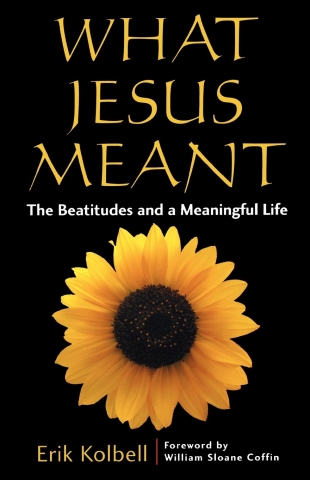Erik Kolbell, a freelance writer, psychotherapist, and former Minister of Social Justice at Riverside Church, New York, starts off with the following fireworks and keeps us on our toes all the way through to the end of this soul-stirring book: "The burning of houses of worship, the bombing of clinics, the shooting of children by children, the baiting of races, the vilification of immigrants, the gating of neighborhoods, all lead me to wonder if it is in our nature to always divide ourselves against ourselves. But when I sit awhile with the Beatitudes, I am taking a tonic for what ails my soul: their restorative powers remind me that not only does God speak a universal language of unconditional love, he expects us to do no less."
This hard-hitting volume examines the eight pillars of "a life of faith in a world of doubt." Jesus, the rabbi, shows us that the path of discipleship consists of meekness, empathy, righteousness, peace, persecution, purity, poverty and simplicity. Just take a moment and let those codes of conduct sink into your consciousness. What do all of them have in common? They go against the grain of contemporary culture. Jesus does not take the path of ease and comfort, and neither can those who follow him.
Loving our enemies is no piece of cake. It takes plenty of practice and an open heart. How about spiritual poverty? Are you up for this challenge? Kolbell offers this definition: "Spiritual poverty means I stand empty before God and naked to the world with absolutely nothing to either commend or condemn me; I refuse to see myself as the sum total of the heft of my resume or the paucity of my credentials, the breadth of my riches or the extent of my debt, the quality of my friends or the disdain of my enemies." Not a bad definition of spiritual maturity. Day by day and in every way, we are challenged to drop out of comparison and competition games. Become a zero.
Kolbell spruces up his meditations on the Beatitudes with quotations that hit the mark over and over. Here is an example: "Legend has it that John Wesley, the founder of Methodism, learned that a British general by the name of James Oglethorpe had caught one of his servants stealing a bottle of wine and beaten him severely for it. Wesley confronted Oglethorpe and asked that the general find it in his heart to forgive the poor servant. 'Sir,' said the officer. 'I never forgive.' To which Wesley replied, 'Then, sir, I hope you never offend!' " This exploration of the meaning of the Beatitudes is exceptional because it is infused with a deep respect for the spiritual practice of justice.
